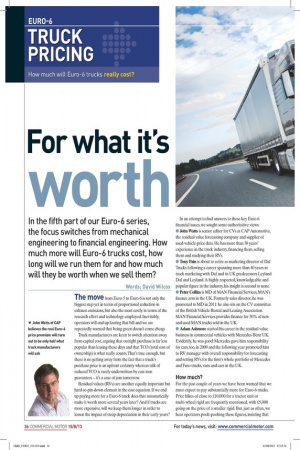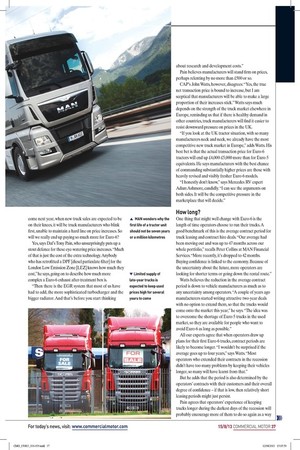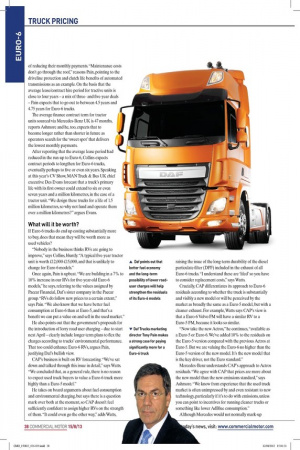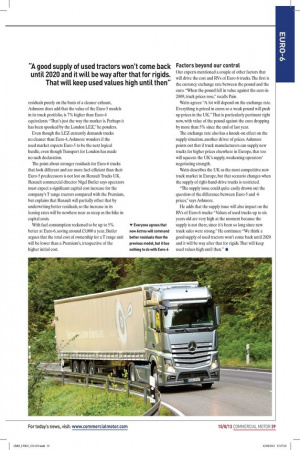EURO-6 TRUCK PRICING
Page 32

Page 33

Page 34

Page 35

If you've noticed an error in this article please click here to report it so we can fix it.
How much will Euro-6 trucks really cost? For what it's vvortri
In the fifth part of our Euro-6 series, the focus switches from mechanical engineering to financial engineering. How much more will Euro-6 trucks cost, how long will we run them for and how much will they be worth when we sell them? Words: David Wilcox
The move from Euro-5 to Euro-6 is not only the biggest step yet in terms of proportional reduction in exhaust emissions, but also the most costly in terms of the research effort and technology employed. Inevitably, operators will end up footing that bill and we are repeatedly warned that being green doesn't come cheap.
Truck manufacturers are keen to switch attention away from capital cost, arguing that outright purchase is far less popular than leasing these days and that TCO (total cost of ownership) is what really counts. That's true enough, but there is no getting away from the fact that a truck's purchase price is an upfront certainty whereas talk of reduced TCO is rarely underwritten by cast-iron guarantees — it's a case of jam tomorrow.
Residual values (RVs) are another equally important but hard-to-pin-down element in the cost equation. If we end up paying more for a Euro-6 truck does that automatically make it worth more several years later? And if trucks are more expensive, will we keep them longer in order to lessen the impact of steep depreciation in their early years? In an attempt to find answers to these key Euro-6 financial issues, we sought some authoritative views:
• John Watts is senior editor for CVs at CAP Automotive, the residual value forecasting company and supplier of used-vehicle price data. He has more than 30 years' experience in the truck industry, financing them, selling them and studying their RVs.
• Tony Pain is about to retire as marketing director of Daf Trucks following a career spanning more than 40 years in truck marketing with Daf and its UK predecessors Leyland Daf and Leyland. A highly respected, knowledgeable and popular figure in the industry, his insight is second to none.
• Peter Collins is MD of MAN Financial Services, MAN's finance arm in the UK. Formerly sales director, he was promoted to MD in 2011: he also sits on the CV committee of the British Vehicle Rental and Leasing Association. MAN Financial Services provides finance for 50% of new and used MAN trucks sold in the UK.
• Adam Ashmore started his career in the residual value business in commercial vehicles with Mercedes-Benz UK. Evidently, he was good: Mercedes gave him responsibility for cars, too, in 2009 and the following year promoted him to RV manager with overall responsibility for forecasting and setting RVs for the firm's whole portfolio of Mercedes and Fuso trucks, vans and cars in the UK.
How much? For the past couple of years we have been warned that we must expect to pay substantially more for Euro-6 trucks. Price hikes of close to £10,000 for a tractor unit or multi-wheel rigid are frequently mentioned, with £5,000 going on the price of a smaller rigid. But, just as often, we hear operators pooh-poohing these figures, insisting that
come next year, when new truck sales are expected to be on their knees, it will be truck manufacturers who blink first, unable to maintain a hard line on price increases. So will we really end up paying so much more for Euro-6?
Yes, says Daf's Tony Pain, who unsurprisingly puts up a stout defence for these eye-watering price increases. "Much of that is just the cost of the extra technology. Anybody who has retrofitted a DPF [diesel particulate filter] for the London Low Emission Zone [LEZ] knows how much they cost," he says, going on to describe how much more complex a Euro-6 exhaust after-treatment box is. "Then there is the EGR system that most of us have had to add, the more sophisticated turbocharger and the bigger radiator. And that's before you start thinking
about research and development costs."
Pain believes manufacturers will stand firm on prices, perhaps relenting by no more than £500 or so.
CAP's John Watts, however, disagrees: "Yes, the true net transaction price is bound to increase, but I am sceptical that manufacturers will be able to make a large proportion of their increases stick." Watts says much depends on the strength of the truck market elsewhere in Europe, reminding us that if there is healthy demand in other countries, truck manufacturers will find it easier to resist downward pressure on prices in the UK.
"If you look at the UK tractor situation, with so many manufacturers neck and neck, we already have the most competitive new truck market in Europe," adds Watts. His best bet is that the actual transaction price for Euro-6 tractors will end up £4,000-£5,000 more than for Euro-5 equivalents. He says manufacturers with the best chance of commanding substantially higher prices are those with heavily revised and visibly fresher Euro-6 models.
"I honestly don't know" says Mercedes RV expert Adam Ashmore, candidly. "I can see the arguments on both sides. It will be the competitive pressure in the marketplace that will decide."
How long?
One thing that might well change with Euro-6 is the length of time operators choose to run their trucks. A good benchmark of this is the average contract period for truck leasing and contract hire deals. "Our average had been moving out and was up to 47 months across our whole portfolio," recalls Peter Collins at MAN Financial Services. "More recently, it's dropped to 42 months. Buying confidence is linked to the economy. Because of the uncertainty about the future, more operators are looking for shorter terms or going down the rental route."
Watts believes the reduction in the average contract period is down to vehicle manufacturers as much as to any uncertainty among operators. "A couple of years ago manufacturers started writing attractive two-year deals with no option to extend them, so that the trucks would come onto the market this year," he says. "The idea was to overcome the shortage of Euro-5 trucks in the used market, so they are available for people who want to avoid Euro-6 as long as possible."
All our experts agree that when operators draw up plans for their first Euro-6 trucks, contract periods are likely to become longer. "I wouldn't be surprised if the average goes up to four years," says Watts. "Most operators who extended their contracts in the recession didn't have too many problems by keeping their vehicles longer, so many will have learnt from that."
But he adds that the period is also determined by the operators' contracts with their customers and their overall degree of confidence — if that is low, then relatively short leasing periods might just persist. Pain agrees that operators' experience of keeping trucks longer during the darkest days of the recession will probably encourage more of them to do so again as a way
of reducing their monthly payments. "Maintenance costs don't go through the roof," reasons Pain, pointing to the driveline protection and clutch life benefits of automated transmissions as an example. On the basis that the average lease/contract hire period for tractive units is close to four years — a mix of threeand five-year deals — Pain expects that to go out to between 4.5 years and 4.75 years for Euro-6 trucks.
of reducing their monthly payments. "Maintenance costs don't go through the roof," reasons Pain, pointing to the driveline protection and clutch life benefits of automated transmissions as an example. On the basis that the average lease/contract hire period for tractive units is close to four years — a mix of threeand five-year deals — Pain expects that to go out to between 4.5 years and 4.75 years for Euro-6 trucks.
The average finance contract term for tractor units sourced via Mercedes-Benz UK is 47 months, reports Ashmore and he, too, expects that to become longer rather than shorter in future as operators search for the 'sweet spot' that delivers the lowest monthly payments.
After reporting that the average lease period had reduced in the run-up to Euro-6, Collins expects contract periods to lengthen for Euro-6 trucks, eventually perhaps to five or even six years. Speaking at this year's CV Show, MAN Truck & Bus UK chief executive Des Evans forecast that a truck's primary life with its first owner could extend to six or even seven years and a million kilometres, in the case of a tractor unit. "We design these trucks for a life of 1.5 million kilometres, so why not fund and operate them over a million kilometres?" argues Evans.
After reporting that the average lease period had reduced in the run-up to Euro-6, Collins expects contract periods to lengthen for Euro-6 trucks, eventually perhaps to five or even six years. Speaking at this year's CV Show, MAN Truck & Bus UK chief executive Des Evans forecast that a truck's primary life with its first owner could extend to six or even seven years and a million kilometres, in the case of a tractor unit. "We design these trucks for a life of 1.5 million kilometres, so why not fund and operate them over a million kilometres?" argues Evans.
What will it be worth?
If Euro-6 trucks do end up costing substantially more to buy, does that mean they will be worth more as used vehicles?
"Nobody in the business thinks RVs are going to improve," says Collins, bluntly. "A typical five-year tractor unit is worth i12,000-£15,000, and that is unlikely to change for Euro-6 models."
Once again, Pain is upbeat. "We are building in a 7% to 10% increase in our RVs for five-year-old Euro-6 models," he says, referring to the values assigned by Paccar Financial, Daf's sister company in the Paccar group. "RVs do follow new prices to a certain extent," says Pain. "We also know that we have better fuel consumption at Euro-6 than at Euro-5, and that's a benefit we can put a value on and sell in the used market."
He also points out that the government's proposals for the introduction of lorry road user charging — due to start next April — clearly include longer-term plans to flex the charges according to trucks' environmental performance. That too could enhance Euro-6 RVs, argues Pain, justifying Daf's bullish view.
CAP's business is built on RV forecasting. "We've sat down and talked through this issue in detail," says Watts. "We concluded that, as a general rule, there is no reason to expect used truck buyers to value a Euro-6 truck more highly than a Euro-5 model." He takes on board arguments about fuel consumption and environmental charging, but says there is a question mark over both at the moment, so CAP doesn't feel sufficiently confident to assign higher RVs on the strength of them. "It could even go the other way," adds Watts,
raising the issue of the long-term durability of the diesel particulate filter (DPF) included in the exhaust of all Euro-6 trucks. "I understand these are `lifed' so you have to consider replacement costs," says Watts.
Crucially, CAP differentiates its approach to Euro-6 residuals according to whether the truck is substantially and visibly a new model or will be perceived by the market as broadly the same as a Euro-5 model, but with a cleaner exhaust. For example, Watts says CAP's view is that a Euro-6 Volvo FM will have a similar RV to a Euro-5 FM, because it looks so similar.
"Now take the new Actros," he continues, "available as a Euro-5 or Euro-6. We've added 10% to the residuals on the Euro-5 version compared with the previous Actros at Euro-5. But we are valuing the Euro-6 no higher than the Euro-5 version of the new model. It's the new model that is the key driver, not the Euro standard."
Mercedes-Benz understands CAP's approach to Actros residuals. "We agree with CAP that prices are more about the new model than the new emissions standard," says Ashmore. "We know from experience that the used truck market is often unimpressed by and even resistant to new technology, particularly if it's to do with emissions, unless you can point to incentives for running cleaner trucks or something like lower AdBlue consumption." Although Mercedes would not normally mark-up
residuals purely on the basis of a cleaner exhaust, Ashmore does add that the value of the Euro-5 models in its truck portfolio, is 7% higher than Euro-4 equivalents. "That's just the way the market is. Perhaps it has been spooked by the London LEZ," he ponders.
Even though the LEZ currently demands trucks no cleaner than Euro-4, Ashmore wonders if the used market expects Euro-5 to be the next logical hurdle, even though Transport for London has made no such declaration.
The point about stronger residuals for Euro-6 trucks that look different and are more fuel-efficient than their Euro-5 predecessors is not lost on Renault Trucks UK. Renault commercial director Nigel Butler says operators must expect a significant capital cost increase for the company's T range tractors compared with the Premium, but explains that Renault will partially offset that by underwriting better residuals, so the increase in its leasing rates will be nowhere near as steep as the hike in capital costs. With fuel consumption reckoned to be up to 5% Everyone agrees that better at Euro-6, saving around £3,000 a year, Butler new Actros will command argues that the total cost of ownership for a T range unit better residuals than the will be lower than a Premium's, irrespective of the previous model, but it has higher initial cost. nothing to do with Euro-6 Factors beyond our control
Our experts mentioned a couple of other factors that will drive the cost and RVs of Euro-6 trucks. The first is the currency exchange rate between the pound and the euro. "When the pound fell in value against the euro in 2009, truck prices rose," recalls Pain.
Watts agrees: "A lot will depend on the exchange rate. Everything is priced in euros so a weak pound will push up prices in the UK." That is particularly pertinent right now, with value of the pound against the euro dropping by more than 5% since the end of last year.
The exchange rate also has a knock-on effect on the supply situation, another driver of prices. Ashmore points out that if truck manufacturers can supply new trucks for higher prices elsewhere in Europe, that too will squeeze the UK's supply, weakening operators' negotiating strength.
Watts describes the UK as the most competitive new truck market in Europe, but that scenario changes when the supply of right-hand-drive trucks is restricted.
"The supply issue could quite easily drown out the question of the difference between Euro-5 and -6 prices," says Ashmore. He adds that the supply issue will also impact on the RVs of Euro-6 trucks: "Values of used trucks up to six years old are very high at the moment because the supply is not there, since it's been so long since new truck sales were strong." He continues: "We think a good supply of used tractors won't come back until 2020 and it will be way after that for rigids. That will keep used values high until then." •











































